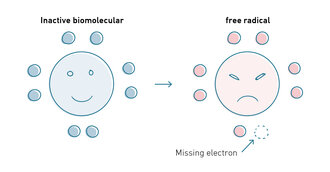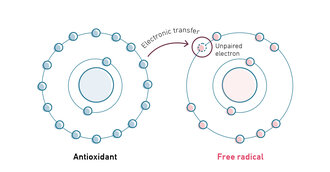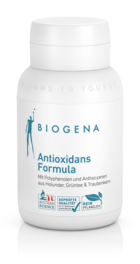What causes tomatoes to rot, flowers to wilt, our skin to age? The answer is – the oxidative processes that take place in the presence of oxygen. While oxidation is part of life, like the air we breathe, if oxidising substances get out of hand, this can lead to oxidative stress. Let us throw some light on the matter.
What is oxidative stress?
Oxidative stress is when the balance between the free radicals (prooxidants) and radical scavengers (antioxidants) gets out of kilter in the body. Free radicals are generally not bad in themselves. They are formed naturally in many metabolic processes (e.g. cellular respiration) without normally becoming a problem, and are very useful in the defence against pathogens, for example.
Free radicals, however, cause stress when their counterweight – our antioxidative protection network – is no longer able to keep these reactive particles in check and cells and metabolic processes are subjected to oxidative infestation.
What are free radicals?
Free radicals are part of our lives like the air that we breathe. The term describes particularly reactive atoms and molecules, which lack at least one electron from a chemical perspective. This deficiency not only makes free radicals unbalanced, it also makes them particularly aggressive. In order to be "complete" again, they hijack an electron from the first reaction partner they can find. As a result, the victim itself becomes a free radical and steals the missing electron as soon as it can from its environment. To ensure that this process does not result in an unchecked chain reaction, the body keeps free radicals under control with the help of radical scavengers.


Causes: How does oxidative stress develop?
While the formation of free radicals in our metabolism is quite natural, certain environmental factors can contribute to a significant increase in aggressive particles and can overload our antioxidant protective network. A single drag on a cigarette is sufficient to release billions of free radicals. Alcohol, stress, environmental toxins, unprotected sunbathing and air travel also unleash millions of free radicals and can unbalance our antioxidative resistance.
How can oxidative stress be reduced?
Fortunately, it is never too late to fight oxidative stress. While it is not possible to escape from all radicals, it is still possible to put an end to one or other of the worst "culprits": People who do without alcohol, nicotine and drugs and who reduce extensive sunbathing, long-haul flights and keep stress to a minimum can limit their own burden of radicals and support the body's antioxidant defence strategies – which brings us to the next point.
How can you protect yourself from oxidative stress?
Whether or not oxidative stress happens is a matter of balance. Whilst a healthy lifestyle helps to keep the formation of free radicals as low as possible (see previous point), a healthy diet rich in vital substances arms us with radical scavengers. Fresh fruit and vegetables are ideal for this. Seeds, nuts and vegetable oils also add protective substances to the menu. Vitamins C and E, as well as zinc, selenium, copper and manganese, are well-known to be full of antioxidants. By combining their forces, they help protect our cells from oxidative damage.
The above-mentioned vital substances are not only present in our natural diet, but also in certain food supplements. Dietary supplements are not a substitute for a healthy diet; however, they can help to provide the body with targeted antioxidative tools. Since antioxidants support and recycle each other, a combination of different antioxidative vital substances makes more sense than one single, unilateral high dose.
Literature with the author.










